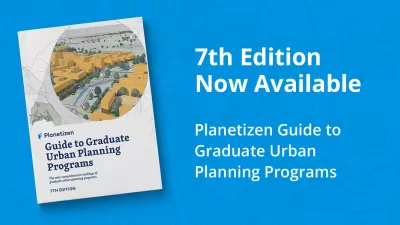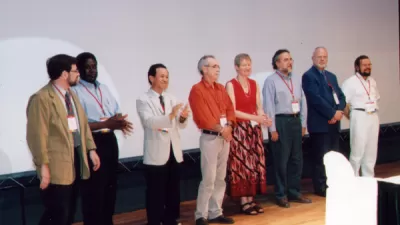Planetizen intern Victor Negrete explains how he made the choice to attend planning school, and the thought process he went through deciding which schools to apply for, and ultimately to attend.
"For my money, urban planning is the best field to be in if you have broad interests and have a zest for big concepts that can be grounded in real-world practice." -Richard Florida
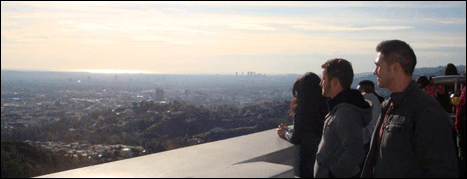
The only thing I was certain of when I completed my undergrad with a degree in Political Science was that I wanted to leave my mark on the world. I did not have the expertise to invent new technologies or find a cure for cancer, but what I did have was a wealth of experience living and studying in places that, simply put, worked better than the city where I grew up.
It was on my daily walk to school in the summer of 2003 when I first realized what so many Los Angeles residents miss out on every day as they suffer the morning commute on the 405 freeway. While Los Angeles commuters honked angrily and applied their makeup in a panic, I strolled through the Kolonaki neighborhood of Athens, Greece awestruck by the history and vibrancy of the city. Similarly, as a junior-year student in Madrid, Spain I was astounded by the ease of navigating a large capital city with only a forty-euro monthly metro pass. As a teenager growing up in the San Fernando Valley I could not even get to baseball practice without having to beg for a ride from my mom.
The glaring differences between suburban and city life were apparent to me from an early age, but I did not realize that these differences were the result of any master plans or city ordinances. Nor did I think at an early age that urban life was desirable. After all, I was surrounded by suburbanites who chose to avoid the supposed inner city violence and poor schools of downtown Los Angeles.
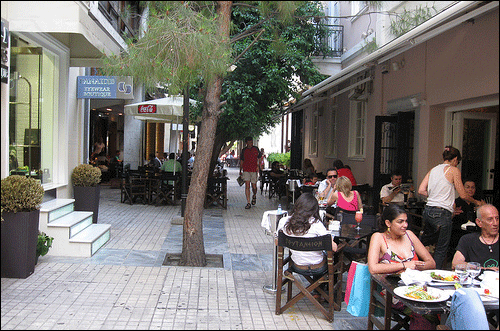
My experiences in downtowns across Europe, South America, and even the U.S were hardly of violence or extreme poverty. Rather, they were full of plazas, cafes, and bustling outdoor markets. These were places where the community (especially the youth) came together to talk, learn, and share. As a child, the closest thing I had to a public space was the food court at the mall.
My experiences abroad changed my perceptions about urbanity, and led me to want to bring positive change to my own hometown and other cities like it around the globe.
Once I realized that I wanted to help transform urban centers into places where ordinary citizens could thrive, socially and economically, I had to decide what would be the best route to pursue such a goal. My first instinct as a political science major, naturally, was to consider an advanced degree in Public Policy or Public Administration. I conducted extensive research on programs of interest and also consulted with several friends who themselves had completed similar Master's degree programs. What I found was that several of these friends were finding it hard to land good jobs in the fields of their choice. The common complaint I heard from friends with MPAs was that these programs are broad and make it difficult to really specialize in any one area. Friends graduating with degrees in International Affairs and/or International Development found that their degrees were too focused and made it difficult to try working for any organizations with a domestic agenda. Certainly, I did not want to pay for a graduate education and encounter the same problems finding employment after graduation.
While researching graduate schools of Policy, Development, and Public Affairs, however, I stumbled upon a field of which I was largely unaware. Urban Planning as a course of study, I found, was often offered by many of the same departments which housed MPA and MPP programs. Out of natural curiosity, I read about the field's offerings and discovered that THIS was the field for me. Everything that interested me about public affairs, international development, and public policy as a tool for shaping prosperous, equitable, and sustainable urban centers was at the heart of urban planning. The field offers a broad selection of areas of specialization with the flexibility to design a program of study as focused or as generalized as an individual may want. I liked that a degree in urban planning can be designed to focus on international planning without limiting the degree designation to a Master of International Affairs, thus allowing an individual the flexibility to work on both domestic and international projects.
Still, the biggest motivator for me to return to school and pursue a graduate degree was to improve my chances for employment in a rewarding, high growth field. I was determined not to end up in a similar place as many recent graduates - with little hope of finding a good job in a tough market and with even more school loans to top it off. Then, I came across an article in U.S. News that named "Urban Planner" as one of the top 50 Careers for 2010. The designation was based on expected growth in the field to be 19% between 2008-2018, according to the Bureau of Labor Statistics. This favorable forecast was just the information I needed to ultimately decide to go to planning school instead of pursue other related academic interests.
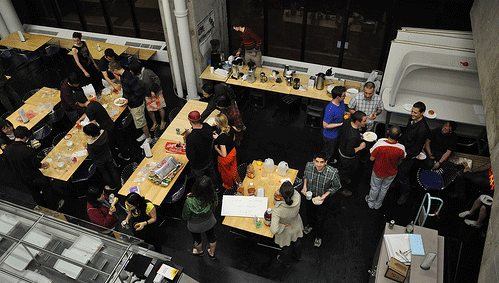
Once this decision was made, I had to choose a planning school. With little information about individual schools' reputations or statistics, I spent weeks scouring the internet for any insights on where to apply. I even resorted to "Facebook-stalking" a current planning student at a major university to get their opinion on the school's program. Then, before I began my internship at Planetizen, a fortuitous web search returned The Planetizen 2009 Guide to Graduate Urban Planning Programs. It helped me find the schools that best suited my interests, and I was interested to find the financial aid stats.
Since applying to graduate schools of planning I have been accepted to four of the top-ranked programs in the country, according to the Planetizen ranking. I intend to specialize in transportation and infrastructure planning while also pursuing a course of study that allows for an investigation of this type of planning in an international context. As for my plans after graduation, I hope to begin a career as a transportation planning consultant and participate in the long awaited development of high-speed rail in California.
Victor Negrete is currently interning with Planetizen, and will be attending Harvard's Department of Urban Planning and Design in the Fall.

Planetizen Federal Action Tracker
A weekly monitor of how Trump’s orders and actions are impacting planners and planning in America.

Map: Where Senate Republicans Want to Sell Your Public Lands
For public land advocates, the Senate Republicans’ proposal to sell millions of acres of public land in the West is “the biggest fight of their careers.”

Restaurant Patios Were a Pandemic Win — Why Were They so Hard to Keep?
Social distancing requirements and changes in travel patterns prompted cities to pilot new uses for street and sidewalk space. Then it got complicated.

Platform Pilsner: Vancouver Transit Agency Releases... a Beer?
TransLink will receive a portion of every sale of the four-pack.

Toronto Weighs Cheaper Transit, Parking Hikes for Major Events
Special event rates would take effect during large festivals, sports games and concerts to ‘discourage driving, manage congestion and free up space for transit.”

Berlin to Consider Car-Free Zone Larger Than Manhattan
The area bound by the 22-mile Ringbahn would still allow 12 uses of a private automobile per year per person, and several other exemptions.
Urban Design for Planners 1: Software Tools
This six-course series explores essential urban design concepts using open source software and equips planners with the tools they need to participate fully in the urban design process.
Planning for Universal Design
Learn the tools for implementing Universal Design in planning regulations.
Heyer Gruel & Associates PA
JM Goldson LLC
Custer County Colorado
City of Camden Redevelopment Agency
City of Astoria
Transportation Research & Education Center (TREC) at Portland State University
Camden Redevelopment Agency
City of Claremont
Municipality of Princeton (NJ)



























